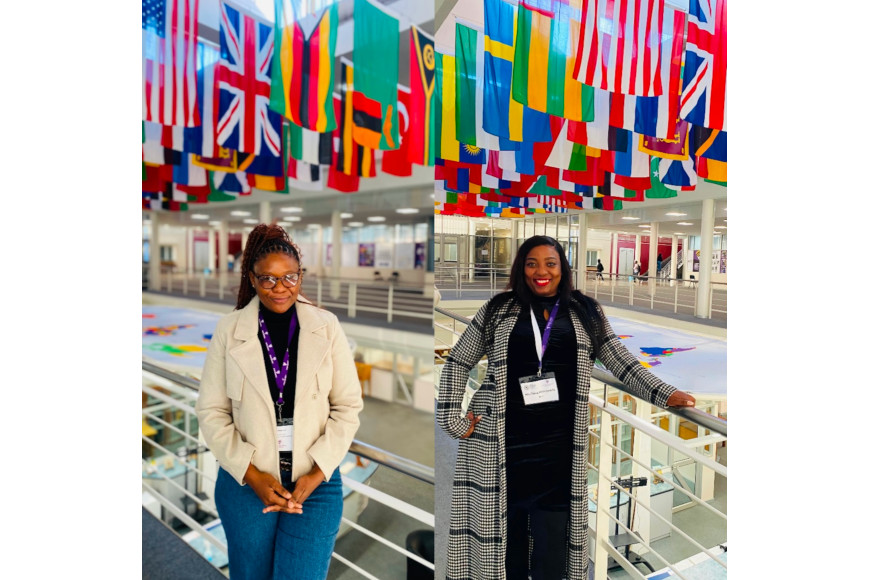Two Durban University of Technology (DUT) academics were invited to be part of the prestigious Advancing Africa-Centred Internationalisation (APUA) Project Masterclass Series 2025 which was hosted at the Rhodes University from 14 July 2025 to 15 July 2025.
Sharing her highlights from the APUA Project Masterclass Series 2025 was Ms Zama Hlongwane. She is a dedicated Maritime Studies lecturer at DUT with over 19 years of practical experience facilitating the movement of goods and services across borders, primarily within Africa through shipping and logistics, beginning from humble origins. She is currently pursuing a PhD in Conservation Science looking at making a meaningful impact to continue to inspire her work and contributions to the maritime sector.
Hlongwane indicated that her participation in the APUA Project Masterclass Series 2025 provided valuable insights and invigorated her enthusiasm for advancing maritime education and industry engagement across Africa. The key sessions that stood out for her included Dr Sioux McKenna’s masterclass who shared her expertise on fostering intra-Africa relationships, a topic incredibly relevant to the current challenges in the complex trade industry. She explained that she learnt a lot from the land-based mobility as a catalyst for academic engagement discussion led by Lebethe Malefo from the University of Fort Hare. She shared that the discussion emphasised resilience and continuous growth, a crucial element for transforming the vision of APUA into a vibrant reality by fostering active academic collaborations and resource sharing across borders.
“The COIL Project which was presented by DUT’s Dr Divinia Jithoo at the APUA Project Masterclass Series 2025 was particularly motivating. It demonstrated how we can leverage our expertise to expose students to global research opportunities and foster university partnerships, thereby expanding our collective impact and contributing to continental development,” she said.
She emphasised that these discussions not only enriched her understanding but also sparked new ideas on integrating a collaborative, continent-wide perspective into her teaching and industry activities. “I am energised to explore how we can collectively participate in this dynamic academic ecosystem,” she relayed.
Hlongwane conveyed that as an advocate for African universities, she champions increased partnerships among regional institutions, believing that such collaboration drives resource sharing, innovation, and capacity building, integral components for sustainable maritime growth across the continent.
Divulging further into the APUA Project Masterclass Series 2025 was Ms Lindelweyizizwe Manqele, a lecturer in the Faculty of Accounting and Informatics at DUT, specialising in Internet of Things (IoT) applications and smart cities. Her scholarly work includes research on user-driven IoT architectures for smart campus environments and the role of IoT in urban development, which has been featured in publications such as CSIR’s ScienceScope, Nka’thuto Edupropeller magazine, DSI Solve programme, Women in Science Africa, DUT Newsletter and SABC News.
She indicated that the APUA Project Masterclass Series 2025, hosted at Rhodes University, represented a pivotal step towards redefining higher education collaboration across the continent. “This event aligned with DUT’s ENVISION2030 strategy, which prioritises innovation, sustainability, and equitable partnerships. The masterclass directly supports DUT’s strategic goals of fostering socially impactful scholarship and transformative education by focusing on themes such as intra-Africa research mobility, decolonial pedagogies, and indigenous knowledge systems. The participation of DUT’s Dr Jithoo, a leading advocate for Collaborative Online International Learning (COIL), further underscored the university’s commitment to bridging global divides through technology and inclusive pedagogy,” she replied.
Manqele emphasised that the APUA Project Masterclass Series 2025 explored critical pillars of Africa-centred internationalisation, including curriculum transformation, land-based mobility, and equitable research partnerships, each of which resonates with DUT’s ENVISION 2030 pillars of people-centredness and innovation. “Sessions led by renowned scholars, such as Professor Sioux McKenna, highlighted the urgency of addressing neocolonial legacies while advancing locally relevant, globally engaged knowledge systems,” she added.
She explained that the session on COIL and inclusive internationalisation, led by Dr Divina Jithoo from DUT, highlighted the transformative potential of COIL in addressing inequalities in global education. Manqele said that the discussion underscored the role of African networks in advancing COIL initiatives, aligning with DUT’s commitment to transformation and Africanisation. She further divulged that participants explored how COIL’s principles of collaborative design, problem-based learning, and online platforms could bridge divides by centering diverse epistemologies and lived experiences. “The focus on curriculum renewal by South African universities and the established COIL practices of European institutions provided actionable insights. The session concluded with a call to leverage these networks for equitable partnerships, ensuring internationalisation benefits all stakeholders without reinforcing historical inequalities. This aligns with DUT’s ENVISION2030 goals of innovation and social justice, positioning COIL as a tool for emancipatory education,” she said.
Her takeaways from the APUA Project Masterclass Series 2025 underscored the transformative potential of Africa-centred internationalisation, emphasising equitable partnerships, decolonial pedagogies, and technology-driven collaboration.
“The key insights included leveraging COIL to bridge global divides, the role of IoT and digital infrastructure in overcoming mobility barriers, and the urgency of integrating indigenous knowledge systems into curricula. The sessions highlighted how initiatives such as intra-African mobility and curriculum transformation aligned with DUT’s ENVISION2030 goals of innovation, sustainability, and social impact, while challenging neocolonial legacies in higher education,” she said.
Pictured: Academics, Ms Lindelweyizizwe Manqele and Ms Zama Hlongwane.
Waheeda Peters

